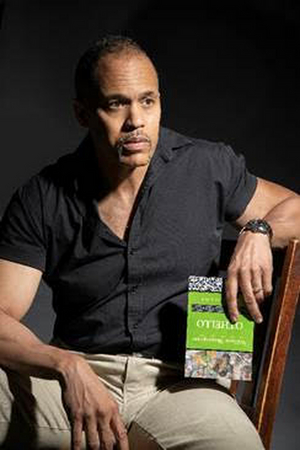Interview: Keith Hamilton Cobb and Kim Weild On Asking the Right Questions with AMERICAN MOOR
|

Writer and star of Off-Broadway's American Moor, Keith Hamilton Cobb and director, Kim Weild, have been on an important journey of giving voice to all human beings, through the show's main themes of re-thinking Shakespeare and examining racism. Told through the experiences of Cobb, who plays an actor auditioning for the role of Othello and receiving pushback from a white director, and being a black man in America, this provocative new play brings critical issues to the surface and bravely asks the questions so desperately needed to be brought to light. American Moor is presented by Red Bull Theater.
BroadwayWorld had the unique opportunity to speak with both Cobb and Weild before the show's final week about the play's monumental impact; how Cobb prepares to take this emotional journey each night; and what conversations the play has inspired with its audience members.
In thinking about the complete journey with American Moor, what does it mean to see the play's impact night after night?
Kim: American Moor asks the important and large questions and challenges audiences to really listen. What I've heard from audience members is that it provides audience members an experience that is provocative, awe-inspiring, and allows them to examine the role of gatekeepers and ultimately who is in charge of making decisions.
Night after night, we have folks stay after the play to speak with Keith and I feel really fortunate to be a fly on the wall for those conversations.
Keith: At the root, American Moor is a play about race and the state of race relations in this country and why we make certain choices. In actuality, it a play for all - the entire state of the human condition, regardless of race. We all want to be understood, loved, and have the freedom to be expressive. It's very cathartic and moving to go through these 90 minutes and allows each one of us to see ourselves reflected back in the show's material.
Keith, how do you prepare yourself to go on this emotional journey?
Keith: It's not easy. To hand over the show to an audience and to be completely present, requires a level of authenticity that's not always easy to master because of the deeply emotional content.
My secret is lots of self-care during my time off stage, so that I am prepared to give it my all when I enter the theater. We've also been thrilled to offer post-performance discussions once a week and have talk backs with those who come to see us. I take pride in being available for these important reflections and allow people to voice what they have discovered.
While this work takes energy and that's something, we may not have an endless supply of, we're ultimately not supposed to run out of love and that's exactly how I feel when dedicating my time to this piece and embracing the follow up that comes with it.
Kim, how do you hope theater will continue to evolve to include more meaningful work like this?
Kim: I think a big part of the job is to inspire questions and make room to include all of the voices. It should be a priority to do the work of equity, diversity and inclusion. It's so important to offer an opportunity to offer up diverse voices and to express ourselves. It comes down to making the room for all to be heard and that needs to be a priority.
American Moor sparks conversations around what we have told ourselves about the plays and characters we know from the works of Shakespeare, and asking, "What is this really about?"
Keith does one of the most remarkable jobs of text analysis that I've ever seen. Not just with the character, but expressing his experience as a black man in American history. It really makes us re-think Othello and questioning why we make certain choices.
What conversations would you like audiences to continue to have as they exit the theater?
Keith: When it comes to my hope for the play, I certainly do not want to impose on the audience and am delighted when members submit their feedback and initiate long discussions with others. We need to be talking about these issues and I felt such a deep need to express a profound experience in me. What people take away is perpetually unique and on their terms. I hope more people will come, as we enter our final week.
American Moor runs through October 5th at the Cherry Lane Theatre. Visit: https://www.redbulltheater.com/american-moor for more information.
Photo Credit: Nina Wurtzel
Videos

